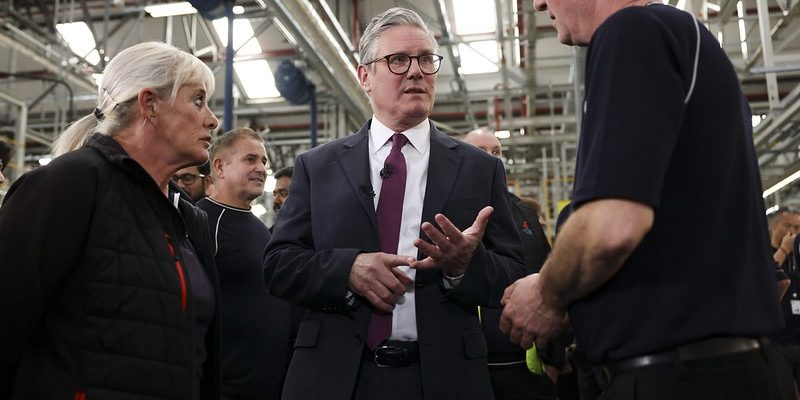Starmer’s trade balancing act: Praiseworthy or pitiful?
Few figures have unintentionally taught the importance of international economics more than Donald Trump. Before his presidency, most laypeople barely understood what a tariff was, and now the front pages are full of news on trade. Keir Starmer has understood the pain tariffs can inflict on the UK, and how international cooperation is necessary if Britain plans to reclaim global influence. However, while his trade deals with the US, India, and the EU signal progress, they are not without sacrifice.
Trump and Starmer are equal in their love for U-turns but hold widely different levels of power over international trade. Yet, Starmer has shown his nature as a pragmatic statesman on the world stage, with his “landmark economic deal” on US trade.
The deal includes two major victories for the automotive and steel industries. Firstly, the 27.5% tariff on UK car exports will decrease to 10%, with Jaguar Landrover stating that the deal was “vital to the UK’s economic prosperity, sustaining 250,000 jobs”. The UK exports £9 billion worth of cars to the US every year, with the US being its largest export market for cars, more than double its second-largest partner, China. The ability to continue sending car exports to America is of great importance and a victory for Starmer.
This deal will not put more money into the pockets of working people as the deal only fixes some of Trump’s recent tariff mania
Furthermore, the UK steel industry was given a rare moment of optimism, with steel and aluminium tariffs no longer throwing more fuel onto an industry already engulfed in fire. The trade agreement saw the complete removal of these tariffs, which, according to UK Steel director General Gareth Stace, provides a “major relief”, especially after the recent struggles British Steel has faced.
But not everyone is convinced. Kemi Badenoch claims: “This is not a historic deal with the US”, further asserting: “We’ve been shafted.”
In a way, she is right. This deal will not put more money into the pockets of working people as the deal only fixes some of Trump’s recent tariff mania. The 10% tariff baseline will continue to be upheld by the US, meaning UK businesses will continue to face higher costs as tariffs impact supply chains and the cost of raw materials. It is important to realise while the UK seemingly receives the most benefit from this trade deal, the deal only entrenches the UK as a junior partner to America.
This new deal removes many agrifood restrictions, allowing for freer trade and hopefully decreasing the costs of products in UK supermarkets
This is particularly worrying as the annual inflation rate was 3.5% in April, notably above the Bank of England’s 2% target.
Luckily for Starmer, his recent trade deal with the EU provides new tangible benefits, rather than reclaiming lost trade. He claims the deal will be “good for jobs, good for bills and good for our borders”.
Since Brexit, the agrifood industry has suffered, as their exports to the EU fell by 21% with a further 7% drop in agrifood imports, largely due to red tape based on different regulations. This new deal removes many agrifood restrictions, allowing for freer trade and hopefully decreasing the costs of products in UK supermarkets. Moreover, the agreement is predicted to provide a £9 billion boost to the UK economy.
Alex Freudmann, managing director of M&S Food, claimed the agreement was a “major step forward” with it removing the “pointless bureaucracy we face in moving our products across Great Britain, Northern Ireland and the Republic of Ireland”.
On the other hand, the agreement has been criticised by Boris Johnson, who signed the deal to leave the EU in 2020. He says the deal is “turning this country once again into the orange ball-chewing, leather-trussed gimp”. However accurate a description this may be of himself, this is obviously exaggerated populist rhetoric to rile people up.
The government claims fishermen will be able to export to the EU without veterinary checks, which will significantly boost exports and reduce the costs of doing business
Nonetheless, his criticism is well-founded. European fishing trawlers have been granted another 12 years to British waters, meaning British fishermen will continue business as usual, allowing EU fishermen to take our fish. This is a concession Starmer gave to achieve this trade deal. He has seemingly sold out our fishermen.
Yet, the details are unsurprisingly more complex than this. Firstly, the UK’s seafood exports have fallen by 26% since Brexit, likely due to increased red tape. The government claims fishermen will be able to export to the EU without veterinary checks, which will significantly boost exports and reduce the costs of doing business. Starmer has also announced a £360 million investment package to modernise Britain’s fishing fleets and bolster support for our fishing communities. It’s clear that, while not optimal, this was a necessary concession to achieve progress.
Ultimately, Starmer’s global Britain is a complex matter, just like all trade deals. Only the turbulent winds and waters that inevitably await us later in 2025 will reveal the details and impacts of these agreements. Will Trump really hold his word? Will the EU trade deal actually benefit the UK? Well, for now, we can safely say it seems like Starmer has shown his pragmatism and made progress in advancing UK economic growth and exports, despite the UK’s relative economic weakness.

Comments